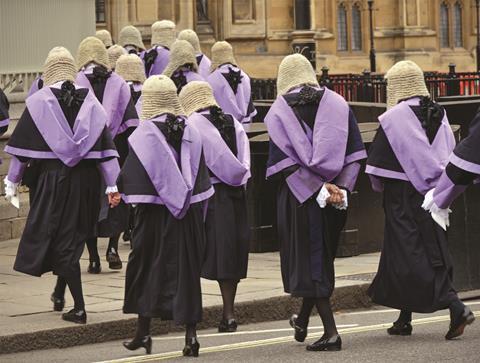It is, perhaps, unsurprising that the Gazette’s John Hyde and I were not allowed to attend the ‘reform roadshow for legal professionals’ held at the end of last month by the courts and tribunals service, HMCTS. Excluding legal commentators from the event reduced the risk that Susan Acland-Hood, the HMCTS chief executive, would have to face informed questions about the Courts and Tribunals (Judiciary and Functions of Staff) Bill, which had been published earlier that day while legal professionals were busy working.

We have been waiting for court reform legislation since last June, when the government promised it in the Queen’s speech. Most of this bill’s provisions were included in the previous Prisons and Courts Bill, which lapsed when parliament was dissolved more than a year ago. But that bill devoted 38 clauses and 13 schedules to courts and judges. Its successor has just three substantive clauses, followed by a single schedule. As Lord Judge once said of another government move, it is a little too late and quite a lot too little.
Ah, but Acland-Hood said at the roadshow last month, this is only the first piece in the jigsaw. There will be further legislation ‘to underpin the online court’ as soon as parliamentary time allows.
Why the legislative drip-feed? It is because a narrowly constrained and obscurely drafted bill is more difficult for the opposition to wreck. Any amendments would have to relate to the judiciary or to staff working for courts and tribunals, making it much harder for MPs or peers to raise contentious issues such as legal aid.
The bill will enable senior judges to use resources more flexibly, allowing part-time High Court judges and recorders to be deployed to courts where they are most needed. More interestingly, the bill will allow court and tribunal staff across all jurisdictions to exercise specified judicial functions and give legal advice to magistrates sitting in family and criminal proceedings.
The role of court legal adviser is not new: for centuries, lay magistrates have been advised by justices’ clerks. Since 2005, these advisers have been HMCTS staff, appointed by the lord chancellor. But the bill would enable legally-qualified staff to be deployed more widely across the various courts and tribunals according to need. For this reason, jurisdiction-specific titles such as justices’ clerk will be abolished. Legal advisers will not be subject to the direction of anybody but the lord chief justice.

Under the bill, HMCTS staff will be authorised to exercise specified judicial functions under the authority of the lord chief justice or the senior president of tribunals. To find out exactly what these functions will be, we shall have to wait for detailed rules to be made by the various rule committees with the agreement of the lord chancellor. But the ministry of justice expects authorised staff to carry out some of the more straightforward judicial functions such as issuing a summons; taking a plea; extending time for service of applications; or considering applications for variations of directions made in private or public law cases. Case officers, as the judges prefer to call them, may also conduct simple telephone mediation.
Again, exercising judicial functions is something that justices’ clerks can do already. At present, though, their powers are limited to those of a single magistrate. In future, authorised staff may have the same powers as a bench of JPs. And they will be deployed for the first time in the Crown Court, where they are needed to take some of the pressure off judges. At present, staff responsible for serious criminal cases can deal only with formal and administrative matters.
HMCTS is expecting to recruit case lawyers who will make decisions based on legal research and an understanding of the legal issues – in just the same way as any other lawyer. It is expected that some judicial functions will be reserved for staff with specified qualifications or experience.
We need to be vigilant whenever judicial powers are exercised by those who are not members of the judiciary. But senior judges have insisted that there will always be a right to challenge decisions taken by court staff. I hope the rules will provide a rehearing rather than an appeal.
Once implemented, the reforms are expected to save a modest £6m or so a year. As well as providing new posts for lawyers, the reforms should also provide more job satisfaction for judges and court staff. But readers may wonder what they have to do with the online court project.
That reform depends on streamlining processes as much as it does on computerising form-filling. But more primary legislation is needed if the project is to achieve its promised savings. No doubt the government’s business managers will be waiting to see how easily this bill gets through parliament before they bring in the next one.
joshua@rozenberg.net



























5 Readers' comments